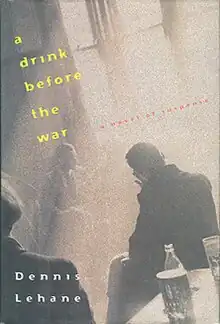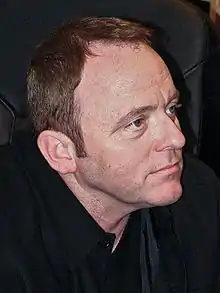 First edition cover | |
| Author | Dennis Lehane |
|---|---|
| Country | United States |
| Language | English |
| Series | Kenzie and Gennaro |
| Genre | Crime |
| Publisher | Harcourt |
Publication date | November 1994 |
| Media type | Print (hardback & paperback) |
| Pages | 267 pp |
| ISBN | 0-15-100093-X |
| Followed by | Darkness, Take My Hand |
A Drink Before the War is a crime novel by American writer Dennis Lehane, published in 1994. It was his debut novel.[1] It is the first book in a series focusing on Boston-based private investigators Patrick Kenzie and Angela Gennaro.
Plot introduction
The story takes place in 1993; Kenzie and Gennaro, a pair of private investigators with a volatile personal relationship, are tasked to retrieve missing documents by a powerful state senator and his protégé. The trail leads them into the midst of a brewing gang war between two rival crack cocaine pushers and reveals an act of child abuse. Kenzie struggles with memories of his own past while Gennaro deals with her abusive marriage.[2]
Plot summary
Boston private detectives Patrick Kenzie and Angela Gennaro are hired by Massachusetts State Senate President Sterling Mulkern, State Representative Jim Vurnan, and State Senator Brian Paulson to recover stolen documents from Paulson's former cleaning lady, Jenna Angeline.
Tracking Angeline to her sister Simone's house outside Boston, they learn that the documents are in a safe deposit box at a nearby bank. Kenzie escorts Angeline to the bank, where she gives him a single photo before being gunned down by an enforcer for notorious drug dealer and pimp Marion Socia. The photo shows Socia with Paulson, implying that he was one of the pimp's clients. Kenzie and Gennaro realize that Angeline has hidden the remaining documents in a different location.
The ensuing investigation takes the detectives from swanky Boston hotels to housing projects in the poorest ghettos of Dorchester. Kenzie wrestles with problems of race, class, urban violence, corruption, abuse, and love. A war erupts between Socia and his teenage son Roland, culminating in the bloodiest night of gang violence in Boston history. A "street terrorism" bill written and sponsored by Paulson that would have curbed the violence is suspiciously stalled before coming to a vote on the weekend of July 4th. All these events are connected to the photographs, and as they pursue the evidence, Kenzie and Gennaro find themselves hunted by both sides.
Eventually the detectives find the photos and learn that Socia prostituted Roland to Paulson years ago; he had sent the photos in an attempt to blackmail Paulson into dropping his support for the bill and Angeline took them after finding him passed out drunk, hoping to finally "get something for herself" after a lifetime of exploitation. Roland gains the upper hand in the war, and Socia demands the pictures in a futile attempt to obtain leverage over his son. Kenzie and Gennaro instead murder Socia in cold blood at the meeting site after seeing that he has no remorse for the lives he's ruined.
Kenzie arranges for his friend, journalist Ritchie Colgan, to publish articles exposing Paulson's molestation after tricking Mulkern into signing a check for payment of services that could be used as evidence of him protecting Paulson, thus shielding him and Gennaro from any future retaliation. Gennaro beats up her abusive husband Phil and leaves him for good, moving in with Kenzie. Roland meets with the duo and assures them that, since Kenzie obscured his face in the photos provided to Colgan, he considers the business between them to be settled and will thus leave them in peace.
Characters
- Patrick Kenzie: A Boston-based private detective from Dorchester. Kenzie works with his lifelong friend Angie Gennaro from an office in a neighborhood church. He is shown to be haunted by memories of his deceased abusive father, Edgar.
- Angela Gennaro: A tough, streetwise detective who grew up with Kenzie. Angie is in an abusive marriage with Phil, a former friend of Kenzie's.
- Bubba Rogowski: A local gunrunner, sociopath, and triggerman who often works with Kenzie as his muscle.
- Devin Amronklin: A Boston police detective on the Anti-Gang Task Force with his black partner, Oscar Lee. A close acquaintance of Kenzie's eager to end the war by any means necessary.
- Richie Colgan: A black journalist at a local paper and longtime friend of Kenzie's, he has made his career reporting on local politicians.
- Marion Socia: Leader of the Raven Saints street gang who has risen to become the most powerful crack dealer in the black sections of Boston.
- Jenna Angeline: Cleaning lady who worked for Senator Paulson, married to Marion Socia and mother of Roland.
- Roland Socia: Teenage boss of the Angel Avengers street gang, fighting a war with his father Socia.
- Sterling Mulkern, Jim Vurnan, and Brian Paulson: A trio of Massachusetts state politicians who hire Kenzie to hunt down Jenna Angeline.
Major themes
Themes of the novel include racial and class warfare, the personal effects of blue-collar bitterness among both white and black working-class individuals, and the emotional damage that can be inflicted by father figures. [3]
Literary significance and reception
The New York Times described the book as somewhat clichéd but praised the honest approach to racial and class warfare.[3] They also felt that the seriousness of the novel's themes made a jarring contrast with the flippancy of the detective characters.[3]
Explanation of the title
The title refers to the gang war that is central to the plot. It is from a line spoken by the character Devin Amronklin midway through the novel and was taken from the BBC sitcom Fawlty Towers episode "The Germans". The same title is used by Sinéad O'Connor for a song on her first album.
Awards and nominations
Dennis Lehane received a Shamus Award for Best First Novel for the book. [1]
References
- 1 2 "Exclusives". Dennis Lehane Books. 2007. Archived from the original on 13 October 2007. Retrieved 2007-09-20.
- ↑ "A Drink Before the War". Dennis Lehane Books. 2007. Archived from the original on 10 September 2007. Retrieved 2007-09-20.
- 1 2 3 "Crime by Marilyn Stasio". New York Times. 1994-12-11. Retrieved 2007-09-20.
External links
- A Drink Before the War at dennislehanebooks.com
